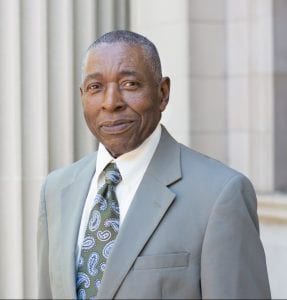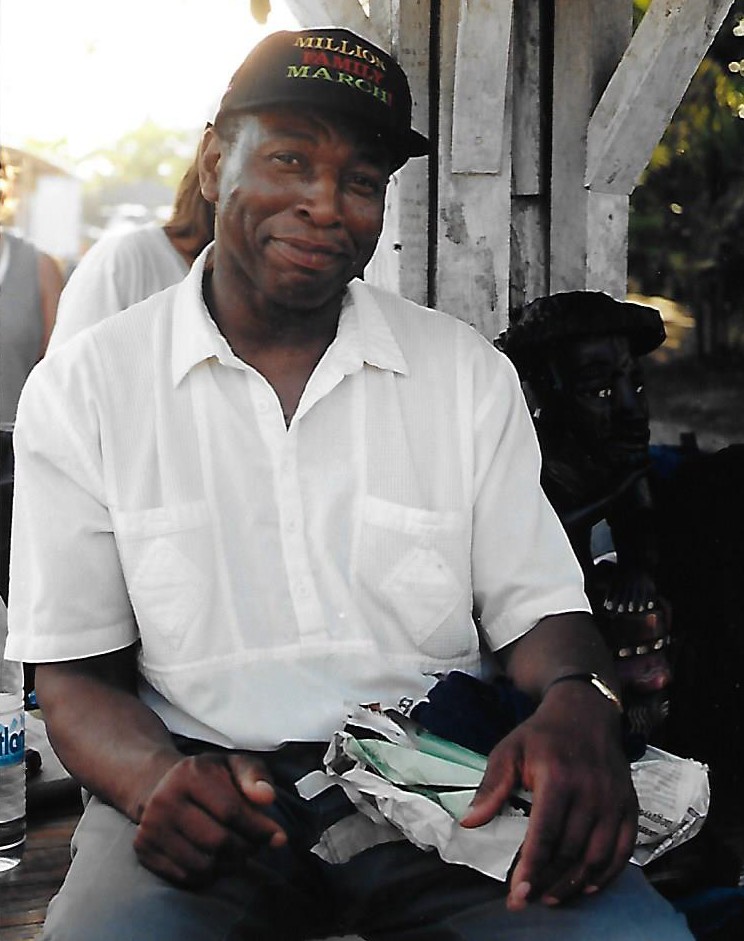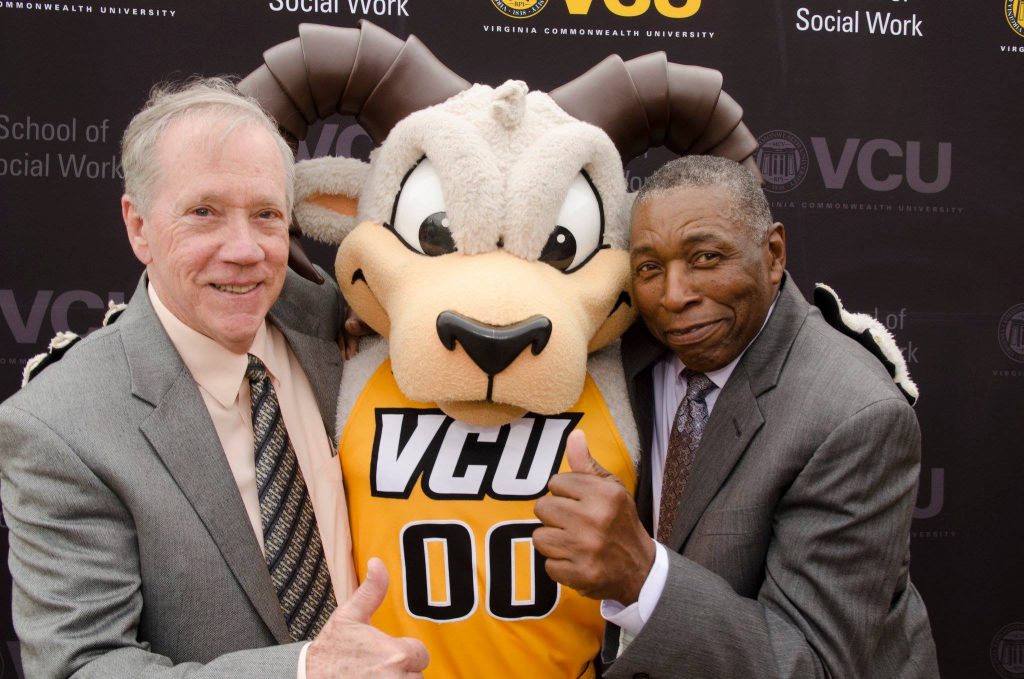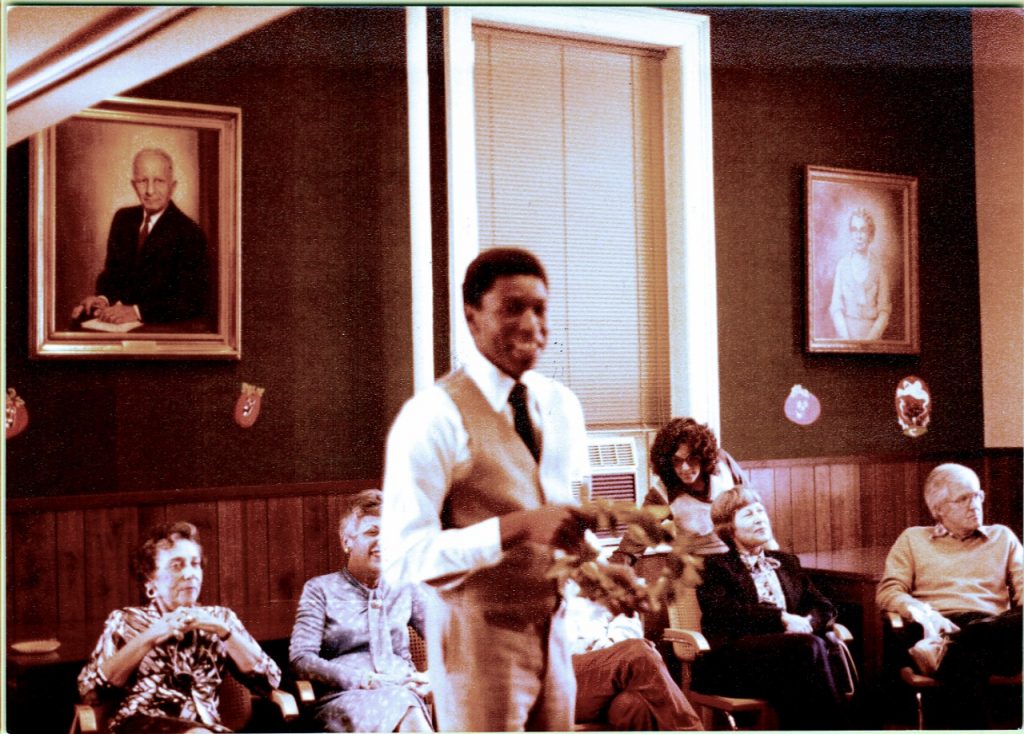‘Where’s Bob?’ Peay was a social work fixture for nearly 50 years
Robert “Bob” Peay was known as a fixture – the team’s North Star – on trips abroad with the VCU School of Social Work.
Which made his penchant for periodically dropping off the radar even funnier to his fellow travelers.

Peay, who retired as emeritus faculty after serving from 1978 to 2005, died March 23 at age 75. He was a steady presence at the school for nearly 50 years, his legacy encompassing a master’s degree in social work (1974) and activism as an alumnus and donor following his retirement.
But to some of Peay’s colleagues, that legacy also includes a running – and well-meaning – joke of “Where’s Bob?” He cultivated this reputation while taking dozens of study abroad and service learning trips to places like Belize, Guyana, the Dominican Republic and Ghana, West Africa. Peay, who owned a construction company after he retired, led building projects on many of the trips.
“When I think of Bob,” says Randi Buerlein, who worked with Peay for eight years, “a theme comes to mind: the frequently repeated inquiry, ‘Where’s Bob?’ or ‘Does anyone know where Bob is?’
“One time, it was at the airport when he never boarded the plane for Ghana. I learned later that he forgot his passport and had to drive back to Richmond, but he was able to catch up with us a day later.
“More often when Bob was missing, I would learn later it was because he had stayed behind to finish some project after everyone else had called it a day,” says Buerlein, who was the school’s director of student services and assistant director of field education from 1997-2013. “Or he was spending time visiting with some people in the village, always as interested in building relationships as building structures. Or he was taking a solo walk to explore his surroundings because he always wanted to know more about the whole community where our project was housed.”
Marcia Harrigan, Ph.D., a classmate in the M.S.W. program and colleague for 26 years, says Peay always was in control, staying positive and ultimately delivering when needed.
“Bob always had a smile and positive attitude even when things did not go as planned: Supplies came up short, or weather flooded our foundation trenches,” says Harrigan, who was M.S.W. program director and a senior associate dean, retiring in 2010 after 32 years. “Bob was always calm in his leadership.
“He also unexpectedly came up ‘missing,’ but always arrived. This led to the ongoing joke, ‘Where’s Bob?’ It was followed by laughter, knowing full well he likely had left to find more materials or arrived only minutes before we boarded the plane to leave the U.S.”

Facilitating student internships
Closer to home, Peay was an integral part of social work students’ field experiences – internships required to gain practical experience – as a field instructor and field liaison. He worked closely with both students and the agencies and organizations where they were placed. No task was too large – or too small – for Peay to ignore.
“He never said ‘no,’ in all the years I knew him,” says Jaclyn Miller, Ph.D., former director of field instruction and Peay’s colleague until they both retired in 2005. “Do we need a field placement in the Tidewater area? ‘I’ll take care of it.’ Can we do this or how about getting a place to do that? He’d always say ‘yes’ and take care of it.
“We needed a big space to meet, and Bob’s church was near VCU. We had a number of our meetings at the church. We used to have a field fair day, where rising first-year students could meet with agencies and talk about placements.
“The other thing he loved to do was feed people. He’d bring in trays of chicken, macaroni and cheese, coleslaw, biscuits, you name it. He cooked it all, 150 people at least. Sandra, his wife, usually baked the sweets.That was part of his pleasure in doing for people.”
Champion for macro social work
Peay’s other passion at the school was for the macro social work curriculum in the master’s program, focused on systems-level policy, advocacy and social justice.
King Davis, Ph.D., a colleague from 1985-99 and former commissioner of the Virginia Department of Behavioral Health, says Peay was driven by the worry that students would lose interest in the important principles of macro social work.
“We had long discussions about field practice, the future of social work and the threats to macro social work practice,” says Davis, who is both a research professor (School of Information) and a professor emeritus (Institute for Urban Policy Research) at the University of Texas-Austin. “He wanted to ensure that social work students did not abandon the policy practice dimension that he felt was under siege.
“To help fix it, he raised money and interest and involvement as a means of buttressing this aspect of the field. He had grand ideas, clear vision and boundless energy that took him abroad to incubate some of his ideas. There were no ideas too small or too large to consider when it came to wanting change and building opportunities for the oppressed or the disenfranchised.”

In 2004, Peay and then-colleague Bob Schneider, Ph.D., established the Social Work Administration, Planning, and Policy Practice Scholarship to support full- or part-time students in the macro concentration. In 2017, the two created a fundraising event, Macro Brew, for the scholarship. To date, 20 social work students have received a scholarship from the fund, whose endowment is now over $100,000.
“It was a pleasure to work with Bob to be certain that students had quality opportunities to intern in organizations that would prepare them to become effective macro practitioners,” says F. Ellen Netting, Ph.D., a former professor and endowed chair who served the school from 1993-2011. “I could always count on Bob to help me problem solve when I was liaising a student placement or needed to find a way to more fully integrate the macro curriculum into a field experience.”
Miller says Peay was the first to place students at the Virginia Legislature for field internships. “That was unheard of 30 years ago,” she says.
Schneider remembers Peay’s zest for the intersection of social work and the political process, nurturing students’ opportunities and experiences.
“Bob’s character meant that he was always current in local, state and national affairs. He had a passion for public policy and all of the compromise and cooperation in its formulation and implementation,” says Schneider, who retired as a full professor in 2008 after 34 years, including a stint as assistant dean.
“He accompanied his students to the Capitol in Washington, D.C., for advocacy days, and I can still see him walking tall down the halls of Congress with his students. Bob also had an appetite for interacting with state legislators in Jefferson’s Capitol in Richmond. He annually passed this enthusiasm and skill on to many social work students.
“It was in his nature to love his students and to support and guide them through their learning and development of values, skills and commitment to social justice.”
Advocate for Black students and social workers
Daryl Fraser, associate professor in teaching, says that when he began as a master’s student in social work at VCU, he was advised by a friend and alumnus to connect with Peay.
“Without knowing anything about me, he immediately embraced me and gave me words of encouragement to let me know that I had the ability to succeed,” says Fraser, who graduated in 2007 and started as a faculty member in 2012. “I was a part-time student, so I had a lot of interaction with him while I was in grad school and thereafter.
“I later learned that Bob provided this same spirit of encouragement to many Black students for decades during his time as professor at the VCU School of Social Work. He has been an adviser, mentor, father figure and an example of what an outstanding social worker should be.”
Peay was an adviser to the school’s Black Student Association – the forerunner to the current Association of Black Social Workers – and deeply involved as a member of the Richmond Association of Black Social Workers.
“Bob helped bridge students, including myself, to the local Richmond chapter, where he was widely known and respected,” Fraser says. “The Richmond association has had an annual fish fry for the past several years named in his honor to carry on his tradition of bringing Black students, alumni and professionals together for the purpose of networking and support.”
Colleague, mentor, friend to the end
Peay was a mentor to his colleagues as well, in ways that opened their eyes on policy, practical skills and personal insights.
“I gained a better understanding of how building schools and orphanages can have ripple effects on addressing large-scale poverty in a community,” Buerlein says. “I also learned the purpose of rebar in constructing a building.”
“Bob challenged me to be clear about what it was about me as a person that could make a contribution to the school, our students and the community,” says Humberto Fabelo, Ph.D., the school’s current associate dean for academic and student affairs. “He was not afraid to ask difficult questions and was the first to roll up his sleeves to do what needed to be done.”
Their recollections also make clear that Peay was a dear friend to his colleagues.
“Soon after arriving at VCU in 1985,” Davis says, “Bob knocked on my office door, and thus began a 35-year friendship that focused on family, community, race, values, economics, government, housing, church, business ventures, research, mental illness, addiction, gender, marriage, adoptions, philosophy, teaching, and the value of genuine friendships. Nothing was off limits. No topic too inconsequential. No dreams held back. No apologies for language used. No offense taken. This was the Bob that I knew and cared so much about over the decades.”
Tom and Susan Carlton’s family and Bob and Sandra Peay’s family were inseparable in the late 1970s and 1980s. Tom Carlton, Ph.D., started at the school in 1973, becoming acting dean before dying of cancer in 1992.
“They met when Bob was a student there and Tom was an assistant professor,” Susan Carlton says. “We became very close. They had three children, and we have three. Bob Peay was a friend, a brother, really. It was like the two families were related.
“When the children were young, we’d go to their house for dinner. This one time we got ready to go home and their son, TJ, decided he would go home with us. It was the cutest; he went out to our car, got in the back and said he was going home with us. When the kids were growing up, it was just a lot of fun.”

Peay’s commitment to his friends continued in spite of his extended illness. He attended Netting’s 50th wedding anniversary celebration.
“The last time I saw him was last August,” she says. “I knew he was dealing with incredible health challenges. When I hugged him and said, ‘I can’t believe you are here,’ he said, ‘It took everything I could muster to be here, but I wouldn’t have missed it.’ That was Bob, a friend and colleague who never let me down, a true inspiration to all who knew him.”
Miller had a similar experience last year at the funeral for the son of a mutual colleague.
“I knew he was not well, but he just kept coming to things. At the funeral, he said, ‘You know, I want us all to get together, and we have to do it soon because I want to cook for you all. I miss cooking.’ ”
SWAPPP Scholarship
To learn more about how you can support Bob Peay’s legacy through the Social Work Administration, Planning, and Policy Practice Scholarship, contact Mary Riddick, social work director of development, at [email protected] or (804) 828-7166.
Comments
A Beautiful Tribute to Bob Peay!! We will continue to honor him at Richmond Association of Black Social Worker. Proud that he was my advisors
Thanks for reading and for your comment, Khadijah!
I love Bob! What a light in the world. So blessed to have known him.
Thanks for your comment, Elizabeth!
Thanks for sharing, Elizabeth!
I was saddened by the news. He was a mentor and friend to me In my early years. I loved his spirit! He did so much to help others to achieve their goals.
Thanks for sharing your memories, Hope!
Hello, I met Bob Peay when I started at VCU, School of Social Work as a member of the First Ph.D. class (09/78). We hit it off immediately and remained friends during my two years at VCU. Always entered his office when I arrived at school each day. His favorite expression when I shared my trials and tribulations of being a doctoral student was, “Say what!” in a high pitched voice! Truly Appreciated his counsel, humor, infectious smile and friendship!
Thanks for sharing your memories, Marc!
Bob was one of the nicest people at the school, always kind and supportive. It was always a pleasure to work with him. Many good memories of him as he modeled what a good social worker says and does.
Thanks for your comment, BJ!
I remember Bob well based on my years at VCU, 78-80. He was a lovely man and an inspiration. As a Macro student, I tried to keep the spirit alive. I had no idea he was not well. I made a spontaneous visit to VCU in the late 80’s or early 90’s. As I approached his office, I thought about what I might say so that he would remember me….as soon as he saw me he said ‘David Hay’ and gave me a mighty hug.
Great story, David. Thanks for sharing your memories of Bob!
Bob Peay was my field liaison in my first year of the VCU MSW program in 1999, and I am grateful that I had the opportunity to learn from him. He was so skilled at helping students to integrate what they were learning in the classroom with their field experiences while demonstrating kindness, compassion, and a sense of humor. My deepest condolences to his family and friends. I know that he will be missed so very much.
Mary Dallas, thank you for your comments and remembrance of Bob!